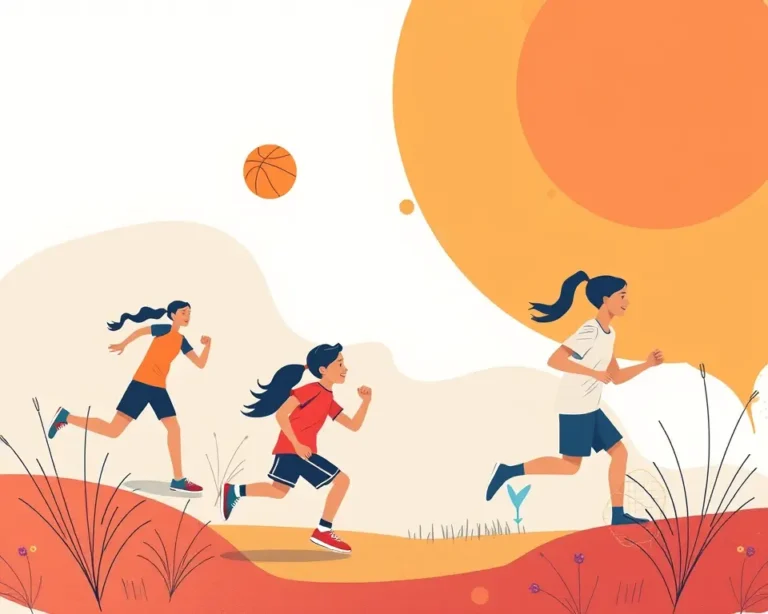It’s no secret that kids need physical activity to stay healthy. But did you know that sports and exercise are also powerful tools for protecting and improving their mental health? With rates of depression and anxiety on the rise in young people, getting kids moving is more important than ever.
The Brain-Body Connection: Why Exercise Works
Exercise isn’t just about building strong muscles; it’s also a workout for the brain. When kids are physically active, their brains release a cocktail of beneficial chemicals, including:
- Endorphins: These are the body’s natural “happy chemicals,” which boost mood and reduce stress.
- Serotonin: This neurotransmitter helps regulate mood and mental health.
- Norepinephrine: This chemical improves mood.
These neurochemicals can have a significant impact on mental well-being, helping to reduce stress, anxiety, and negative thinking. Studies even suggest that exercise can be as effective as medication in improving mental health and happiness levels in teens.
Key Mental Health Benefits of Sports and Exercise
Regular physical activity offers a wide range of mental health benefits for children and adolescents:
1. Reduces Stress and Anxiety
Exercise helps kids blow off steam and reduces levels of stress hormones like cortisol. Whether it’s running around the playground or participating in organized sports, physical activity can provide a healthy outlet for frustration and anger. Studies show that even just 20 minutes of outdoor activity per day can decrease stress and anxiety.
2. Improves Mood and Self-Esteem
The release of endorphins during exercise can lead to a more positive mood and increased feelings of well-being. Additionally, sports and exercise can help kids develop a sense of competence and self-esteem as they learn new skills and overcome challenges. Experiencing the sense of mastery that comes with practice can be a huge boost for a child’s confidence.
3. Combats Depression
Physical activity is often prescribed as a way to prevent and manage symptoms of depression. Regular exercise and sports participation can help protect against depression and suicidal thoughts by boosting self-esteem and increasing social support. A study found that boys who play sports during their early childhood are less likely to experience emotional stress, including depression and anxiety, later in life.
4. Enhances Social Skills and Reduces Isolation
Team sports, in particular, provide opportunities for social interaction, cooperation, and camaraderie. Being part of a team helps kids make new friends, strengthen social connections, and develop important social skills like communication, leadership, and conflict resolution. This is especially important in today’s world, where kids may be spending more time behind screens and less time interacting face-to-face.
5. Improves Focus and Attention
Exercise can improve cognitive function, including attention and memory. Regular physical activity helps direct the brain’s resources toward improved coordination and focus. This can be particularly beneficial for children with ADHD, as exercise has been shown to reduce symptoms and improve self-regulation.
6. Promotes Better Sleep
Regular physical activity can improve sleep quality, which is essential for both physical and mental health. However, it’s important to avoid vigorous exercise close to bedtime, as it can raise body temperature and interfere with sleep.
7. Teaches Valuable Life Skills
Sports can teach kids important life skills such as teamwork, discipline, resilience, and sportsmanship. They learn how to work together to achieve a goal, cope with setbacks, and respect others. These skills can help them succeed not only in sports but also in school, relationships, and future careers.
8. Reduces the Risk of Substance Abuse
Participation in sports reduces the risk of teen substance abuse and other reckless behaviors. Exercise can stimulate similar parts of the brain’s reward system, helping teens avoid or recover from substance use disorder.
Team vs. Individual Sports: Which is Better?
Both team and individual sports offer mental health benefits. Team sports provide a sense of community and teach valuable social skills. Individual sports can be done at any time and don’t require other people, which can be helpful for kids who prefer solo activities.
Research suggests that team sports may be more supportive for athletes’ mental health than individual sports. One study found that young athletes in individual sports were almost twice as likely to report symptoms of depression compared to those in team sports.
Ultimately, the best choice depends on the child’s individual preferences and personality. It’s important to find activities that they enjoy and that fit their interests and abilities.
Beyond Sports: Other Ways to Get Kids Moving
Sports aren’t the only way for kids to get the mental health benefits of exercise. Other activities that can promote physical and mental well-being include:
- Outdoor play: Running, jumping, and playing games in the park or backyard.
- Dancing: A fun and creative way to get exercise and express oneself.
- Martial arts: A great way to improve physical fitness, discipline, and self-confidence.
- Yoga: Promotes relaxation, mindfulness, and body awareness.
- Family activities: Hiking, biking, swimming, or playing active games together.
How Parents Can Help
Parents play a crucial role in encouraging kids to be physically active and supporting their mental health:
- Lead by example: Be physically active yourself and make exercise a family affair.
- Find activities that your child enjoys: Let them explore different sports and activities until they find something they love.
- Make it fun: Focus on enjoyment and effort rather than winning.
- Provide encouragement and praise: Celebrate their efforts and accomplishments.
- Limit screen time: Encourage kids to spend less time on social media and more time being active.
- Be mindful of your own emotions: Remember that you’re modeling how to behave, so maintain control of your emotions during games and practices.
- Create a supportive environment: Make sure your child feels comfortable talking about their feelings and experiences.
A Word of Caution: The Dark Side of Sports Specialization
While sports offer many benefits, it’s important to be aware of the potential downsides of sports specialization, which involves intense training in a single sport from a young age. This can lead to:
- Increased stress and anxiety: The pressure to perform at a high level can be overwhelming.
- Social isolation: Spending too much time training can limit opportunities for social interaction outside of sports.
- Burnout: Overtraining and lack of variety can lead to physical and mental exhaustion.
- Injuries: Repetitive movements and high-intensity training can increase the risk of injuries.
It’s important to encourage kids to participate in a variety of activities and to prioritize their overall well-being over athletic achievement.
The Takeaway
Sports and exercise are powerful tools for protecting and improving kids’ mental health. By encouraging regular physical activity and creating a supportive environment, parents can help their children develop the resilience, confidence, and social skills they need to thrive. So, get your kids moving and watch them flourish, both on and off the field!







